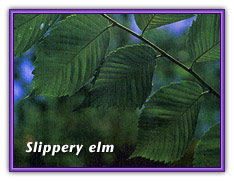 Source
Source
Slippery elm is the inner bark of a tree in the elm family, formerly known as U. fulva, native from Maine through the St. Lawrence valley, west to the Dakotas, south to Texas, and east to Florida. The bark is harvested from wild trees; the rough outer bark is removed and the inner bark retained.
Traditional Use
Slippery elm was one of the most useful medicinal plants of the American wilderness. Native Americans from the Missouri River Valley used a tea of the fresh inner bark to make a soothing laxative. Among the Creek, a poultice of the bark was a toothache remedy. The Osage and other groups applied bark poultices to extract thorns and gunshot balls. Surgeons during the American Revolution used bark poultices as their primary treatment for gunshot wounds, and a soldier, separated from his company, survived for ten days in the wilderness on slippery elm and sassafras barks. During the War of 1812, when food was scarce, British soldiers fed their horses on slippery elm bark. Nineteenth-century physicians recommended slippery elm broth as a wholesome and nutritious food for infants and invalids, and the tea has long been the herbal treatment of choice for acute stomach ulcers and colitis. Adopted as an official drug for the first U. S. Pharmacopoeia in 1820, slippery elm was listed until 1936.
Current Status
Slippery elm is a good example of an herb that works well for a particular purpose which has not been disputed. The inner bark contains high amounts of mucilage, made up of starch, polysaccharides, and low levels of tannins. When water is added to the powdered bark, the "slippery" brew is soothing to irritated mucous membranes of the intestinal tract, as well as the throat. It is still approved by the Food and Drug Administration as a nonprescription product for demulcent use.
Preparations
Cut-and-sifted and powdered bark are available. Only a handful of herb milling plants produce slippery elm powder, as it is highly combustible. Lozenges containing slippery elm are sold in the American market.
Cautions
No side effects or special cautions are noted.
Symptoms
Convalescence
Gastrointestinal irritation
Sore throat
Actions
Nutritive

![]()
![]()
![]()
 Source
Source